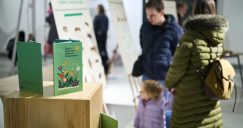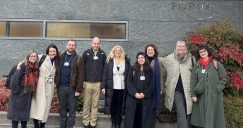Settings for regenerative learning
Open Schooling

- Article, Educational resource, Research
Open Schooling (OS) is a term promoted by the European Union that refers to schools as agents of wellbeing. Through cooperation with enterprises, universities, and local communities, students work with real-life problems to develop the competences that they need to ensure sustainable life and desirable futures (Okada & Gray, 2023).
OS is an approach in which purposeful collaborations are built between schools and their wider communities. It offers students the opportunity to learn together in the real world and widens their horizons to learn from people other than their teachers.
Families, experts and other stakeholders collaborate with teachers and students to address relevant local challenges, contribute to community development, and promote an active global citizenship attitude. (Make it Open, 2022).
The emphasis in OS is on identifying locally relevant issues or challenges and to work with other stakeholders from the local community to explore or solve these – see this video from the Open Science Hub project.
Open learning and open schooling are broad terms which describe learning which is ‘open’ in terms of timing, location, teaching roles, instructional methods, modes of access, and any other factors related to learning processes. Most schools already do some level of open learning, through excursions and trips, site visits and remote learning.
Resource
OS Together is an informal network of EU funded projects around Open Schooling. they have a shared newsletter, social media handles and an email address. They organise regular meet-ups to foster collaboration and inspire professionals with open schooling methodologies.
The Open Schooling Navigator is a tool developed by the EU funded project Make it Open to guide educators in finding learning scenarios for open schooling. The tool has an advanced search function to narrow down the learning materials according to the educators needs.
The Teacher Training Innovation Toolkit on Open Schooling developed by the EU funded project PHERECLOS is a handbook for teachers and teachers in training to develop open schooling activities to be integrated in a school-based context.
Research results from the Fedora project can be useful to inform OS design and practice, in particular the focus on future-oriented concepts and elements. The Fedora Project Handbook contains a number of recommendations for OS based on these findings:
- Use futures thinking to cross, connect and contextualise 21st century skills.
- Incorporate future concepts and elements in science curricula.
- Incorporate futures thinking in science teacher education programs.
- Understand and address the personal, gendered, cultural, religious, socioeconomic and political dimensions of futures thinking and related beliefs.
- Foster the development of future-scaffolding skills
- Elicit students’ scientific and technological images of the future.
- Address ongoing and emerging trends in science and technology.
- Highlight the role of human agency in the development of science and technology and in sociotechnical change.
- Address and embrace complexity and uncertainty.
- Embrace emerging teaching using interdisciplinary projects.
- Practise different types of futures thinking.
- Deconstruct spacetime rituals in science classrooms.
- Guide the students to manage tensions and overcome polarizations.
- Use collective group work to open up to alternative futures.
The Fedora project website also provides a useful list of resources and references including book recommendations, videos and articles.








